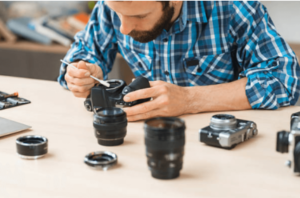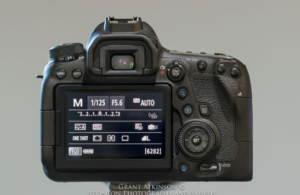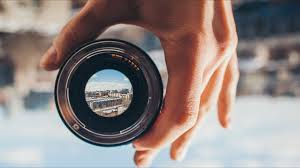How to Care for and Maintain Your Camera Equipment ?
In the world of photography, your camera is your most valuable tool. Proper care and maintenance are crucial to ensure your equipment performs at its best and lasts for years. In this guide, we’ll explore essential tips and techniques to help you keep your camera in top condition.
General Maintenance Tips
Regular Cleaning
Regular cleaning is vital for maintaining your camera’s performance. Dirt, dust, and smudges can affect image quality and camera function.
Cleaning the Lens
The lens is the eye of your camera. Keep it clean to ensure sharp and clear photos. Use a blower to remove dust, followed by a microfiber cloth to gently wipe the lens. For stubborn smudges, a lens cleaning solution can be used.
Sensor Cleaning
A dirty sensor can ruin your photos with spots and smudges. Use a sensor cleaning kit specifically designed for your camera model. Be gentle and follow the instructions carefully to avoid damaging the sensor.
Cleaning the Body
Don’t forget the camera body. Wipe it down with a damp cloth to remove grime and fingerprints. Pay special attention to the buttons and dials, ensuring they are free of debris.
Storage Solutions
Proper storage can protect your camera from damage and environmental factors.
Proper Storage Practices
Store your camera in a cool, dry place. Avoid areas with high humidity or direct sunlight, which can damage the internal components.
Using Camera Bags
Invest in a good quality camera bag with padding to protect against shocks and drops. Make sure the bag has compartments to keep your gear organized and safe.
Humidity Control
Use silica gel packs in your storage area or camera bag to control humidity. Excess moisture can lead to mold growth and damage electronic components.
Handling Your Camera
Proper handling can prevent many common issues.
Proper Handling Techniques
Always use a camera strap to avoid accidental drops. Hold the camera with both hands and avoid touching the lens or sensor with your fingers.
Avoiding Common Mistakes
Don’t expose your camera to sudden temperature changes, which can cause condensation. Avoid leaving your camera in a hot car or under direct sunlight for extended periods.
Protecting Your Camera
Using Protective Gear
Protective gear can prevent physical damage and extend your camera’s life.
Lens Filters
Use UV or clear filters to protect the lens from scratches and dust. They are inexpensive and can be easily replaced if damaged.
Camera Armor
Consider using camera armor or silicone covers to protect the body from bumps and scratches.
Screen Protectors
A screen protector can prevent scratches on your camera’s LCD screen, keeping it clear and readable.
Environmental Protection
Cameras are sensitive to environmental factors. Take steps to protect them in different conditions.
Weather Sealing
If your camera isn’t weather-sealed, use a rain cover when shooting in wet conditions. Avoid changing lenses in dusty or windy environments.
Protecting Against Dust and Sand
In sandy or dusty areas, keep your camera in a sealed bag when not in use. Use a blower to remove dust particles from the camera body and lens.
Temperature Extremes
Avoid exposing your camera to extreme temperatures. In cold weather, keep it close to your body to stay warm. In hot conditions, keep it in the shade and avoid direct sunlight.
Travel Tips
Traveling with your camera requires extra precautions.
Traveling with Camera Gear
Use a dedicated camera backpack with padding and compartments. Ensure it’s small enough to carry on an airplane to avoid rough handling by baggage handlers.
Airport Security
At airport security, request a hand inspection of your camera gear to avoid exposure to X-rays. Place your camera in a separate bin to prevent it from being knocked around.
Packing for Safety
Wrap delicate items like lenses in soft cloths or bubble wrap. Use padded dividers in your camera bag to keep everything secure and organized.
Maintenance Schedule
Regular maintenance can prevent many issues and keep your camera in optimal condition.
Daily Checks
Before each use, check the battery level, clean the lens, and ensure the memory card is properly inserted.
Monthly Maintenance
Perform a more thorough cleaning once a month. Check for firmware updates from the manufacturer and install them to ensure your camera has the latest features and fixes.
Annual Servicing
Consider taking your camera to a professional for an annual inspection and deep cleaning. They can check for any internal issues and perform maintenance that might be beyond your skills.
Troubleshooting and Repairs
Common Issues
Cameras can encounter various issues, from lens problems to battery failures.
Lens Issues
Dirty or scratched lenses can affect image quality. Keep them clean and protected. If you notice persistent problems, it might be time for professional cleaning or repair.
Battery Problems
Batteries can lose their charge over time. Ensure you’re using the correct charger and replace old batteries when they no longer hold a charge.
Sensor Troubles
If you notice spots on your photos that can’t be cleaned off the lens, the sensor might be dirty. Use a sensor cleaning kit or seek professional help if you’re unsure.
DIY Fixes
Some minor issues can be fixed at home.
Basic Repairs You Can Do at Home
For minor scratches on the lens, use a lens pen. Clean battery contacts with a dry cloth to improve connection. Replace worn-out straps and accessories.
When to Seek Professional Help
Recognizing serious problems early can save you from costly repairs.
Recognizing Serious Problems
If your camera displays error messages, refuses to turn on, or shows significant image quality issues, it’s time to seek professional help.
Finding a Reliable Technician
Look for technicians who specialize in your camera brand. Check reviews and ask for recommendations from fellow photographers.
For those looking to choose the right camera, make sure to read our detailed guide on What features should I look for when selecting a digital camera?
RELATED POSTS

How Can You Fix Focus Issues in a Camera Lens That Consistently Produces Soft or Blurry Images?

How Photographers Can Optimize Their Use of Multifunctional Control Dials for Faster Adjustments ?

What are the essential features to look for when buying a lens?

